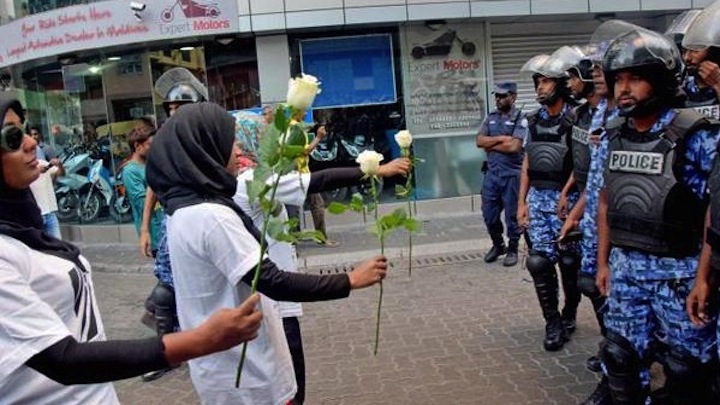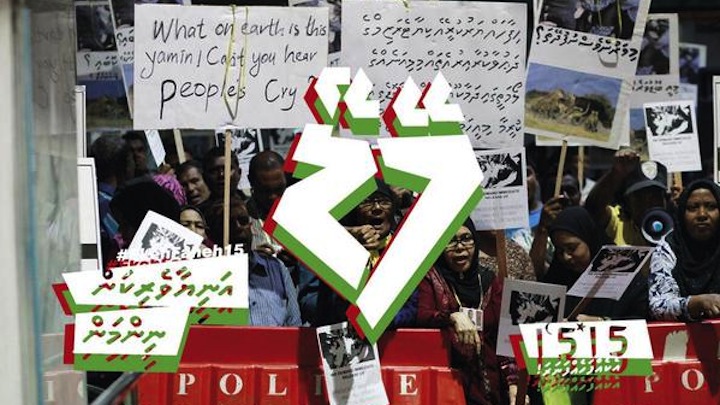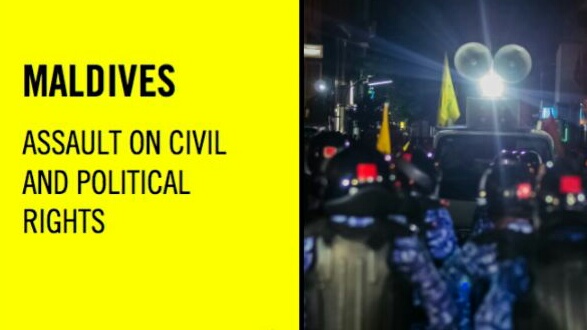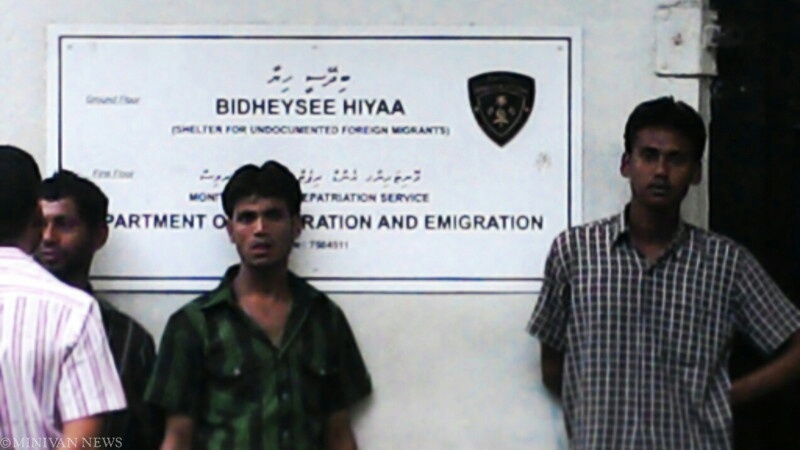The government has accused Amnesty International of tarnishing the Maldives’ image in collusion with the opposition, dismissing its concerns of a crackdown on human rights as “preposterous fabrications with zero truth”.
Amnesty’s observations of a “rapidly deteriorating” human rights situation are “fallacious”, contended foreign minister Dunya Maumoon, accusing the organisation of seeking to “undermine and defame the Maldives judiciary and its national institutions.”
“The general human rights situation in the Maldives has been improving steadily especially following the reform agenda launched in 2004 leading to the ushering in of a modern constitution in 2008,” she insisted in a statement on Friday.
“Additional impetus has been seen during President [Abdulla] Yameen’s government in terms of promotion and protection of human rights.”
The enactment of 18 pieces of legislation under the current administration is “an unparalleled record in the history of the Maldives,” she added.
Amnesty had said in a report last week that the government is cracking down on peaceful protests, stifling dissent, and “abusing the judicial system” to imprison opposition politicians.
“Ludicrous”
Amnesty’s allegation of police attacking peaceful protesters “is ludicrous and an absolute lie”, Dunya said.
The nightly anti-government protests staged by the opposition coalition in the capital “attract an extremely small crowd, and the police are able to control the protest well and ensure peace and security for all citizens of Malé.”
“The opposition MDP have however, by contrast, in the past been responsible for systematic acts of arson and other violent acts,” the ministry claimed.
MDP spokesperson Imthiyaz Fahmy told Minivan News today that Dunya was speaking on behalf of the Gayoom family. Dunya is the daughter of ex-president Maumoon Abdul Gayoom and niece of president Yameen.
“Foreign minister Dunya Maumoon sounds like North Korea when she keeps rejecting any concern raised by any international organisation, be it Amnesty, the Commonwealth, European Union, United Nations or even concerns raised by friendly countries,” he said.
“This says it all. The government has no intention at all to protect human rights in the country and come into line with the internationally recognised standards.”
Engagement
Amnesty’s briefing report titled ‘Assault on civil and political rights’ was released after a delegation conducted a fact-finding mission in the Maldives from April 17 to 22.
The delegation said it sought meetings with government officials and a visit to Dhoonidhoo detention centre to meet ex-president Nasheed, but the foreign ministry offered to facilitate the meetings in May.
However, Dunya said the delegation visited the Maldives on April 27 despite a mutual agreement to schedule a visit for May and “choose to meet with only officials and supporters of former President Nasheed’s opposition Maldivian Democratic Party (MDP).”
The ministry said it has facilitated visits to Nasheed in prison by the International Committee of the Red Cross, the Commonwealth, and the Office of the High Commissioner for Human Rights.
“The government of Maldives maintains its engagement first policy and continues to hold constructive dialogue with its international partners, including international non-governmental organisations that are serious about and value such dialogue,” it said.
“Sham trial”
After launching the briefing at a press conference in Delhi last Thursday, Abbas Faiz, Amnesty International’s Maldives researcher, said Nasheed’s imprisonment “came after a sham trial.”
“It is disturbing how far the Maldives government has co-opted the judiciary as a tool to cement its own hold on power,” he said.
Nasheed was sentenced to 13 years in prison last month after a 19-day trial widely criticised by foreign governments and the UN for its apparent lack of due process.
However, the foreign ministry said Amnesty’s accusations about Nasheed’s trial are “without any basis.”
Nasheed was sentenced for the “abduction and enforced disappearance” of criminal court chief judge Abdulla Mohamed in January 2012.
“President Nasheed has been tried, convicted and sentenced for this heinous crime as per Maldivian laws,” the ministry said.
“His rights were assured to him and he chose not to appeal the verdict or sentence of Criminal Court. Amnesty through its baseless allegations once again seeks to undermine and defame the Maldives judiciary and its national institutions.”
Amnesty had said it “welcomes the investigation of alleged past human rights abuses committed in the Maldives, but the organisation remains concerned that the case pursued against Mohamed Nasheed was politically motivated and selective” as human rights abuses under both the current and previous presidents remain unaddressed.
“Amnesty International is also concerned that the outcome of the trial appeared to have been predetermined to procure a conviction against Nasheed even before the trial began,” the briefing stated.








